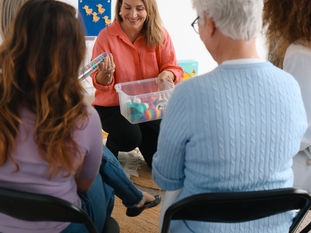top of page
You're Not Alone: Supporting Families of Neurodivergent Children
0
12
0
Over the past few weeks, I’ve had the pleasure of speaking with many families through Parenting Connection and during Neurodiversity Week at Bicton Primary School. These conversations have reinforced the importance of raising awareness about hidden disabilities—not just for families navigating these challenges, but also for the wider community. My goal in these discussions is to let families know they are not alone and to help others better understand the experiences of neurodivergent children and their families.

The Challenges Families Face
While the rollout of the National Disability Insurance Scheme (NDIS) has expanded access to therapy services, it has also introduced more complexity. Families now find themselves managing multiple points of contact, from therapists to behaviour support practitioners, each providing feedback and updates on different plans. This can be overwhelming and add to the stress families already experience.
Additionally, as we shift towards a strength-based approach to supporting neurodivergent individuals, new terminology and evolving perspectives can create additional pressures for families to understand and navigate. Most parents I work with simply see their child as their beautiful, unique child, with their happiness as the highest priority.
Our time at Bicton Primary School!
For many families, the journey to understanding their child’s needs begins later in childhood. Unlike families of children born with a visible disability, parents of neurodivergent children often spend the first few years believing their child will develop independence without significant challenges. Receiving a diagnosis later means their grieving process can look different. Hidden disabilities can also be harder to explain to extended family, schools, and the wider community. Misunderstandings about behaviour challenges—often seen as misbehaviour rather than a mismatch between skills and environment—can add to the emotional burden, making advocacy a constant responsibility for parents.
Major transitions, such as a new school year or teacher, can bring additional stress, as families experience cycles of stability and struggle. Many parents find themselves continually advocating, educating, and upskilling those around them about hidden disabilities—a role that can be exhausting.

Finding Strength in Community
Despite these challenges, I am continually inspired by the dedication, love, and advocacy of parents of neurodivergent children. By increasing awareness for their own children, they are also paving the way for greater inclusion and understanding for future generations.
The good news is that support for families is growing. More services and resources are available, helping to build stronger, more connected communities. My biggest advice to families is to stay connected—don’t isolate yourself. There are many people who understand your journey and are ready to support you.
Support Services in Western Australia
If you’re looking for community and resources, here are some great support options:
Kiind (www.kiind.com.au) – Support groups and Peer Navigators providing parent consultation.
Ocean Heroes (www.oceanheroes.com.au) – Surfing the Spectrum programs across WA, including regional areas.
PlayConnect Playgroups (www.playgroupwa.com.au) – Inclusive playgroups for families with young children who have autism or developmental concerns.
Remember, you are not alone, and together, we can continue breaking down barriers to inclusion for children with hidden disabilities.

Related Posts
Comments
Share Your ThoughtsBe the first to write a comment.
bottom of page







